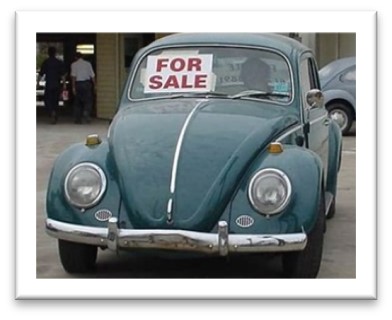Before You Buy a Used Car
Test drive the car under varied road conditions (hills, highways and in stop-and-go traffic.
Ask for the car’s maintenance record.
Determine the value of the vehicle.
Research the upkeep costs for models you’re interested in, including the frequency of repairs and maintenance costs.
Examine the car using an inspection checklist.
Check whether there are any unrepaired recalls on a vehicle.
Consider hiring a mechanic to inspect the car.
Pay in Full or Finance
You have two choices: pay in full or finance over time.
When financing; shop around, compare offers, and negotiate the best deal you can.
Buyers Guide
The Federal Trade Commission” (FTC) Used Car Rule requires dealers to display a Buyers Guide in every used car they offer for sale and give it to buyers after the sale.
The buyers guide tells you:
The major mechanical and electrical systems on the car
Whether the vehicle is being sold “as is” or with a warranty
What percentage of the repair costs a dealer will pay under warranty
To get all promises in writing
To ask to have the car inspected by an independent mechanic before you buy
To get a vehicle history report
The dealer’s contact information, including the contact for complaints
To remember: spoken promises and difficult to enforce
Warranties
As Is – No Dealer Warranty – When the dealer offers a vehicle “as is,” the box next to the “As Is – Ne Dealer Warranty” disclosure on the Buyers Guide must be checked.
Implied Warranties – State laws hold dealers responsible if cars they sell don’t meet reliable quality standards. These obligations are called implied warranties – unspoken, unwritten promises from the seller to the buyer.
Implied Warranty of Merchantability – The seller promises that the product offered for sale will do what it’s supposed to do.
Implied Warranty of Fitness for a Particular Purpose – Applies when you buy a vehicle based on the dealer’s advice that it is suitable for a particular use.
Full and Limited Warranties – Dealers may offer a full or limited warranty on all or some of a vehicle’s systems or components. Most used car warranties are limited and their coverage varies.
Warranty Documents
Make sure you get a copy of the dealer’s warranty document if you buy a car that is offered with a warranty.
Unexpired Manufacturer’s Warranties
To make sure you can take advantage of the coverage, ask the dealer for the car’s warranty documents.
Service Contracts
A service contract may be arranged any time and always costs extra. The separate and additional cost distinguishes a service contract from a warranty. To decide if you need a service contract consider:
Whether the service contract duplicates warranty coverage or offers protection that begins after the warranty runs out.
Whether the vehicle is likely to repairs and how much they’re going to cost.
Whether the service contract covers all parts and systems.
Whether a deductible is required and, if so, the amount and terms.
Whether the contract covers incidental expenses.
Whether repairs and routine maintenance have to be done at the dealer.
Whether there’s a cancellation and refund policy for the service contract, and if it has cancellation fees.
Private Sales
Buying a car from a private individual is different from buying from a dealer.
Private sellers are not covered by the Used Car Rule and don’t have to use the Buyers Guide.
Private sales are not covered by the “implied warranties” of state law.
The car may be covered by a manufacturer’s warranty to a separately purchased service contract. However, warranties and service contracts may not be transferable, and other limits or costs may apply.
